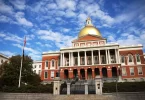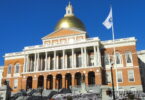By Claudia Chiappa
Boston University Statehouse Program
BOSTON — A growing number of communities are recognizing Indigenous Peoples Day in lieu of Columbus Day, with Boston being the latest. The state, however, is still lagging behind and state Sen. Jo Comerford, D-Northampton, is working to pick up the pace.
Support for the celebration of an annual, statewide Indigenous Peoples Day has been growing in Massachusetts, where state laws still recognize the celebration of Columbus Day. Two bills currently in the Legislature’s Committee on State Administration and Regulatory Oversight could change that.
The change is happening incrementally. Acting Boston Mayor Kim Janey signed an executive order Wednesday to replace Columbus Day with Indigenous Peoples Day in the city. The action was met with approval by several Indigenous tribes and organizations.
Mahtowin Munro, co-leader of United American Indians of New England and lead organizer of the statewide Indigenous Peoples Day campaign said that Janey’s executive order was a great step in the right direction.
“The doors of Boston City Hall were closed to us for many years,” said Munro. “Mayor Janey listened to us and worked with us to make that happen.”
The executive order is a result of collaboration with the United American Indians of New England, the North American Indian Center of Boston, and members of the Massachusett Tribe.
But Comerford is a Senate sponsor of legislation that would replace Columbus Day with Indigenous Peoples Day statewide, a change that is receiving overwhelming support from an increasing number of lawmakers.
“Massachusetts should celebrate the Indigenous people on whose land we sit by honoring Indigenous heritage and by not commemorating their oppressor,” state Rep. Brandy Fluker Oakley, D-Boston, sponsor of the House bill, said during a virtual committee hearing. “Who we choose to celebrate demonstrates whose contributions we value in Massachusetts.”
Comerford said celebrating Columbus Day perpetuates a “dangerous, revisionist, sanitized history.”
“As the lawmaking body with the unique power to create holidays and elevate certain historic figures and groups, we have an awesome responsibility to get it right,” Comerford testified. “Not to disseminate false information, not to engage in historical revisionism, to know, understand, and acknowledge accurate history.”
Columbus Day became a federal holiday in 1937. Over the years, however, there has been increasing controversy over the celebration, with many activists pointing out the history of enslavement, colonization, and genocide Columbus initiated in the Americas.
The idea of Columbus discovering America is a very “limited, inaccurate summary of what Columbus’ actions actually were,” said Comerford. This interpretation of history does not account for the Indigenous communities who already lived on American land, or for the several explorers that came before Columbus.
“We don’t tell the accurate story of what happened to the Indigenous communities flourishing throughout America,” Comerford said. “We don’t tell the story of colonization. We don’t tell the story of the violence that ensued. We erase the Indigenous people from the narrative.”
As of 2021, Columbus Day remains a federal holiday, which means offices and schools close nationwide on the second Monday of October. But the number of local governments and communities choosing to change the name of the holiday is growing.
“Every single year more and more people find out the truth about Columbus and understand why it’s important to replace Columbus Day with Indigenous Peoples Day,” said Munro. “And understand why it’s really important to learn more about Indigenous history.”
Over 20 Massachusetts communities already celebrate Indigenous Peoples Day, including Amherst, Northampton, Easthampton and Holyoke. Nationwide, 19 states and the District of Columbia recognize Indigenous Peoples Day, but Massachusetts has yet to do the same.
“If people would actually stop and listen, they would understand why it’s important and meaningful to do this,” Munro said.
Some of the resistance against the proclamation of Indigenous Peoples Day has come from Italian-Americans over the years. More recently, however, several Italian groups mobilized to show their support for the holiday, including Italian Americans for Indigenous Peoples Day. Columbus was an Italian explorer and navigator.
“By championing Indigenous Peoples Day, we celebrate the diverse histories and cultures of this land’s First Peoples and their many contributions to modern society.” reads an online statement by Italian Americans for Indigenous Peoples Day. “We also honor our own ancestors who persevered in this country despite being victimized for their ethnicity, and we follow the example of the many Italian Americans throughout this country’s history who fought for civil and human rights for all.”
Comerford said this type of support is spreading around the state.
“People are awake to this racial justice impact and taking the steps necessary to right historic wrongs,” Comerford said. “There is resistance, but it is diminishing.”
A number of states decided to celebrate both holidays. This solution, however, is not acceptable, said Munro.
“Celebrating Columbus as a hero is very problematic for Indigenous people,” said Munro. “Columbus himself was actually a monster. He’s not somebody who should be celebrated.”
Previous attempts to establish Indigenous Peoples Day in the state have failed. The most recent bill to die in the State House did not move out of the committee in 2020. But Comerford thinks things might be different this time around.
“It’s not a matter of if it will happen, it is a matter of when,” said Comerford. “And the when will be determined by the number of people who take action and say to the Legislature, make this a priority.”
This article originally appeared in the Daily Hampshire Gazette.





